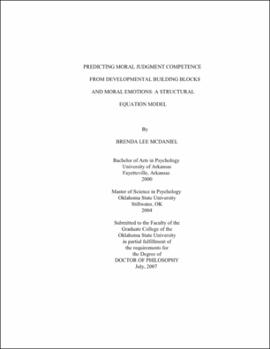| dc.contributor.advisor | Grice, James W. | |
| dc.contributor.author | McDaniel, Brenda Lee | |
| dc.date.accessioned | 2013-11-26T08:27:42Z | |
| dc.date.available | 2013-11-26T08:27:42Z | |
| dc.date.issued | 2007-07 | |
| dc.identifier.uri | https://hdl.handle.net/11244/6961 | |
| dc.description.abstract | Scope and Method of Study: The purpose of the study was to explore the variables that impact moral judgment competence. Moral judgment competence was defined as the cognitive reasoning ability to be consistent in the application of moral principles across situations. It was hypothesized that the building blocks of moral development included one's family interactions (e.g., dysfunctional patterns), spiritual life, and ascription to different sources of moral authority (e.g., teachers and peers, religious institutions, and one's concern for society's welfare and human equality, etc.). These early developmental building blocks were hypothesized to foster individual moral emotional development in young adulthood, particularly empathy, shame, and guilt. These moral emotions were hypothesized to predict moral judgment competence in young adulthood. These hypothesized relationships were tested in a structural equation model that represents the first known attempt to combine moral developmental building blocks, moral emotions, and moral judgment competence. The current model also represents an attempt to bridge the two theoretical orientations of social learning/social cognition and cognitive structuralism. Lastly, the current model theorized a developmental trend such that as progression towards the prediction of the outcome variable of moral judgment competence occurs, the corresponding constructs occur at later points in the lifespan. | |
| dc.description.abstract | Findings and Conclusions: A parsimonious set of analyses involving a three step process was chosen to test the model: (1) image factor analysis, (2) regression, and (3) LISREL fit statistics. The current structural equation model was found to be a poor overall fit for the observed data. However, the measurement model fit well in terms of factor loadings and the structural model showed promising relationships among constructs. There was no support found for the integration of the theoretical orientations of social learning/social cognition and cognitive structuralism. However, the present study creates novel theoretical contributions, generates a structural equation framework for future multi-construct research, and provides knowledge about presently unexplored relationships such as ascription to moral authority sources and moral emotions. | |
| dc.format | application/pdf | |
| dc.language | en_US | |
| dc.rights | Copyright is held by the author who has granted the Oklahoma State University Library the non-exclusive right to share this material in its institutional repository. Contact Digital Library Services at lib-dls@okstate.edu or 405-744-9161 for the permission policy on the use, reproduction or distribution of this material. | |
| dc.title | Predicting moral judgment competence from developmental building blocks and moral emotions: A structural equation model | |
| dc.contributor.committeeMember | Morris, Amanda Sheffield | |
| dc.contributor.committeeMember | Reese-Melancon, Celinda | |
| dc.contributor.committeeMember | Thomas, David G. | |
| osu.filename | Mcdaniel_okstate_0664D_2438.pdf | |
| osu.accesstype | Open Access | |
| dc.type.genre | Dissertation | |
| dc.type.material | Text | |
| dc.subject.keywords | structural equation modeling | |
| dc.subject.keywords | moral development | |
| dc.subject.keywords | moral emotions | |
| dc.subject.keywords | moral judgment competence | |
| dc.subject.keywords | social learning / soc | |
| thesis.degree.discipline | Psychology | |
| thesis.degree.grantor | Oklahoma State University | |
